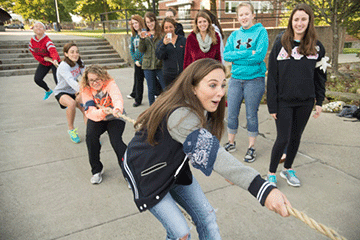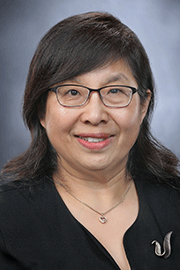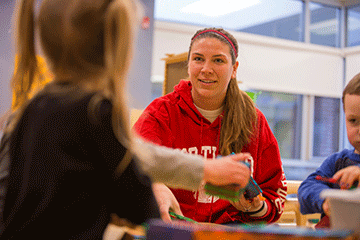
04/19/2022
Lin Lin, a SUNY Cortland associate professor of childhood/early education, spent the first part of her career teaching in her native China, using traditional rote memorization methods, before experiencing American-style history classes as a visiting scholar in Portland, Oregon.
The experience at Reed College in the late 1990s changed the course of her professional life.
“In the past, how I taught history in China was ‘dead people and remote places marked on a map,’” said Lin, who had come to America with a bachelor’s degree in English and a master’s degree in American studies from Beijing Foreign Studies University.

“In America, I learned that history is really an interpretive process in which narratives should be written from multiple perspectives using primary and secondary sources,” she said.
After her American classroom awakening, Lin earned a Ph.D. in social science education from University of Georgia. She has spent the next 16 years developing and modeling her own unique teaching skills for future elementary school teachers at SUNY Cortland.
Earlier this month, Lin’s novel teaching methods helped earn her the honor of being named the 16th recipient of the university’s Rozanne M. Brooks Dedicated Teacher Award.
The Brooks Award honors a faculty member who devotes a significant amount of time both to teaching and to working with students outside of class. The award includes a $7,500 honorarium to enhance the recipient’s teaching initiatives.
Lin will be recognized formally next fall when the university hosts an Excellence in Teaching, Research and Service Reception for faculty and staff.
“The Brooks Award Committee was nothing less than astounded at Lin Lin’s energy and creativity in her classes,” said SUNY Distinguished Professor of Anthropology Sharon R. Steadman, a past Brooks Award recipient and committee chair. “She accomplishes so much in each class without ever seeming to be in a hurry. One is rather mesmerized by what she teaches and is reluctant to leave once class is over.”
The selection committee also included Associate Professor Helena Baert, Physical Education Department; SUNY Distinguished Teaching Professor Steven Broyles, Biological Sciences Department; and Associate Professor Kim Wieczorek, Childhood/Early Childhood Education Department.
“I’m so humbled and honored to get this award when there are so many other people who deserve it,” Lin said. She had started her career in her native country as an English language interpreter and then had taught students English for 17 years using the memorization method Chinese students all learned at school.
Lin has taken the exact opposite approach in the classroom since joining the SUNY Cortland School of Education faculty in 2005. For example, to show pre-service teachers how to make social studies come alive, Lin will take her students outside to play actual tug-of-war with a rope to learn how the continental army overcame the British in the American Revolutionary War.
“The factors that helped the American continental army win against the British, that stays with them,” Lin added about her all-in style of teaching. “You have to be really passionate so you won’t burn out.”
Lin teaches undergraduate courses in social and academic curriculum, elementary social studies method courses, and social and academic curriculum; and graduate courses in teaching elementary social studies methods, teaching conflicts and controversy in social education, and democracy and social education. She is a faculty co-advisor for the university’s Asian American Pacific Islander Student Union.
She will use the Brooks Award stipend to diversify her office library of children’s and adult educational books, established with some of her own money. New children’s titles will expand on less usual family units in terms of gender composition or family situation, for example, families with an incarcerated member. She’d also like to add more texts on southeast Asian countries and South Asian American communities. Lin wants to continue subscriptions to online remote learning applications she uses to engage with young students in synchronous online teaching and that her students use when their classes meet online.
“Students learn best when they are actively engaged in learning when teaching is grounded in their lives, when they are learning about things that hold meaning to them, and when they have choices with their learning,” Lin said.
“Students have unique identities and should be taught according to the ways they learn best,” she added. “And students learn more when they are encouraged to reflect on their learning experiences.”
Kimberly Rombach, SUNY Cortland associate professor of childhood/early childhood education, noted that students see Lin as both challenging and supportive.

“In class, she presents material that portrays multiple perspectives about the world in which we live in ways that encourage deep, meaningful discourse,” Rombach wrote in a recommendation letter. “She develops lessons that engage her students to reflect on their own misconceptions about differences while guiding them toward understanding the cultural universals we all share.”
Andrea Lachance, dean of education, noted that Lin's teaching presentations are engaging, entertaining and enlightening.
“Her enthusiasm for learning is contagious, and students are drawn into her teaching by her warm, open nature and natural curiosity,” Lachance said.
Lachance said that Lin wants students to develop the critical thinking and evaluative skills to examine their own assumptions and biases in teaching children about social and cultural issues.
Lin’s scholarly reputation crosses international boundaries.
“She has been an invited presenter on a variety of different topics pertaining to education at elementary, middle, high school and university settings in China,” Rombach said. “She has promoted collaborative efforts to discuss possible future plans to develop inter-campus relationships and activities between SUNY Cortland and international schools in China.”
Lin enthusiastically shares traditions from her own family and culture with her students, both in her home with her famous dumplings and at various campus events. Although she doesn’t teach STEM, Lin has helped colleagues in science disciplines run the annual field trips to Raquette Lake; and assisted with a 2016 winter session cultural study/service trip to Costa Rica.
Lin brought an extra suitcase full of “teaching aides” — magazines, playing cards, crayons, puzzles and the like — so that she could help support the work of our students who were charged with teaching English to young Costa Rican children on that trip, Lachance said. Each night, she assembled games and activities to support the next day’s English “lessons.”
Underpinning Lin’s classroom performance is her extensive scholarship in the field of social studies education, her colleagues noted. Lin is well published individually and collaboratively and increases the knowledge-base for teaching social studies, not only for her students but current teachers and other social studies teacher educators.
The Brooks Award was endowed through the generosity of the late Rozanne Marie Brooks, a SUNY Distinguished Teaching Professor and SUNY Cortland professor emerita of sociology and anthropology, and her former students, friends and colleagues. A SUNY Cortland faculty member for 36 years, Brooks died in 1997. The first award was presented in spring 1998, with 15 honorees since then.